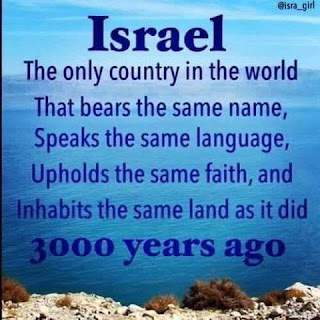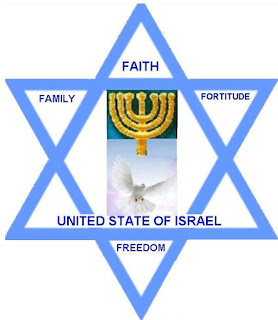Arab Israel
There is no glib or ready solution to the present
confrontation. Enmity bread over decades
cannot be easily defused. The Arab-Palestinian
"refugees" have found their "myth" as Mousa Alami
prescribed. They found an identity in
that myth. And a dream. But surely a dream of destruction, mayhem and
bloodshed, of "injustice" masquerading as justice, of and
"rights" based upon deception and falsehoods, cannot and should not continue
to capture the sympathy and imagination of the gullible outside world at the
expense of the Jews, whose identity the Arab-Palestinians would usurp.
If Egypt
and the late president Anwar Sadat could make peace with Israel ,
however tenuous, after a saber rattling and the religiously inspired
anti-Jewish sentiments that created a warm bond between Egypt
and Nazism, then so might the other "moderates" and
"rejectionists" in the Arab world today. Once, during Solomon's reign (965-928 BC),
"United Israel" which extended all the way to Iraq, was so
"highly honored as the leading state between Egypt and Asia minor,"
that Egypt's pharaoh "had given his daughter in marriage" to Solomon,
for "good diplomatic and political reasons."
As the minister of agriculture of Syria ,
an avowed supporter and supportee of the Soviet Union ,
had illustrated, it was "American" technological assistance that Syria
wanted and needed. But might it have
been the irrigation expertise of Israel
that he really needed? The result of the
peacemaking process depends greatly on the international community continued
adherence to the truth as it is sometimes tacitly acknowledged, and not the
totalitarian-sponsored pan-Arab deception and inversion of truth. To achieve their short-sighted ends -- a
"peaceful" piece of the Arab oil action -- some nations among the
free world community appear to be buying the turn-speak (false and deceptive
propaganda).
For sixty-five years, while the real nature of the Arab
"refugee problem" has often been identified, the affluent Arab world
has paid only a relative pittance to the care of the "refugees"; on the other hand, prodigious Arab funds have
supported terror and violence. The Arabs
have, in addition, rejected every genuine humanitarian attempt to solve the
"problem" of their brethren, whose right to dignity of citizenship is
their legitimate human right. But The Arab nations chose to use then as a pawn
against Israel .
The world community has made the mistake of unwittingly
creating a breeding ground of violence and terror. Through perpetuation of the
"humanitarian" conditions of the "temporary" camps, it
hoped perhaps to avoid having to exact from the Arab world an attitude towards
its refugees that conform to the customary requirements expected from other
nations; the penalty for such demand was perceived to be the possible loss of
substantial Arab oil benefits (which today has diminished greatly). The wound was allowed to fester until it
began to burst into the terrorism of the PLO and other offspring of the earlier
terror tactics in Western Palestine organized by the
Mufti after WWI, in consultation with his Nazi soulmates. Now, the world community is being faced with
a Pan-Arab suggestion for another blunder, this one even more difficult to
retrieve. The new "moral"
flame is presently offered, to take the place of justice. Through the deceptive revisionist history of
Arab propaganda, it is asserted that Israel
must bear the guilt for the Arab "refugees", since the Jews "in
1948 excluded the Arabs from their homeland since time forgotten." Unfortunately, and perhaps not surprisingly
to those sophisticated in the art of politics, the case as it has been falsified
and distorted by propaganda does not benefit the "Palestinian" Arab
refugees themselves. As the Palestinian
writer Fawaz Turki summed it up, although it was "Arab governments"
who "continued to oppose... integration," the price for this intransigence and
inflexibility was paid by the Arab-Palestinians alone and not by the Arabs....
Pawn politics and indifference were the two foci of a problem of tragic and
human dimensions.
The Arab Soviet distortion has prolonged the refugees
frustration, and supports -- indeed rationalize and justifies -- Arab terrorist
activities, even against Arab-Palestinians.
The very political process by which the refugees plight has been
highlighted has condemned many Arab "refugees" to encampment psychologically
if not physically (the situation today in Syria
is no different). However, hundreds of
thousands of other Arab "refugees" are already living and working in
the critically labor-needy Arab states, in some instances running those
countries (Jordan's population is about 75% Arab-Palestinians), and they feel
that citizenship is "owed" to them.
Indeed, unpublicized and largely unknown, many are in fact already bona
fide citizens.
The present propaganda argument is based on the deceptive "historical
claims" of the "native Arab Palestinians on his land" -- now
called Israel
(The real truth is we all know that the Arabs are the occupiers of Jewish
territory). According to the propaganda
claim, it is from the Jewish settled area of Western Palestine
that the "Arabs were excluded from their homeland since time forgotten". That claim cannot be sustained. If the "historical" claim is measured
against documented history, which contradicts that claim, the Arab propagandist
and their supporters often shift to an argument based on pragmatics: the " Arab-Palestinian people"
exist, therefore they must have a "homeland". That argument must run head on into the
realities of justice, of Jordon, and the Arab-Jewish exchange of refugee
population in 1948 (the Arab state of Jordan
consists today over 78% of Jewish Territory).
The Arabs recognition of how vulnerable was their
"return of the Arab refugees" argument inspired the transformation of
the "refugee" into a false "historical" claim. "Arab-Palestinian
self-determination" was the "new tool"; claim is based on the
specious and misconceived comparison of the "90% Arab-native including
Christians etc. and 9%-Jewish population," in all "Palestine "--
what we now know should properly be limited, for comparison, to the Jewish
settled area of Western Palestine . As a few Arab strategists have admitted, the
real "refugee" rights could too easily become evident. The "consequences" of the obvious
Arab Jewish refugee exchange of populations were frankly assessed by the Arab
writer Sabri Jiryis; "Jews have absorbed the million Jews who were terrorized
and expelled from Arab states and the Arab states, in their turn, must settle
the Palestinians "Arabs" within their borders and solve their
problems."
Although the Arab-born segment of the Jewish population has
finally been recognized, inevitably, as the bulk of the "Sephardic"
majority within an "Orientalized" Israel ,
which amounts to over half the current population. Western observers are seldom
reminded that the Sephardic Israeli majority is in fact mainly composed of
either the descendants or of those who were themselves the Jewish Arab refugees
who were terrorized and expelled from Arab-Muslim countries. Thus, the
accompanying social problems, the Arab-born Jews' distrust of the Arab world and
their Support of a "hard-line" government position toward the Arabs--all
conditions that are predictable and logical when seen in context--are not
evaluated in context. That the social problems are the results of Israel's
attempt to absorb a refugee population at least double to the number of Arabs
who purportedly left Israel in 1948--a massive Jewish refugee population that doubled
the number of Jews already in Israel in 1948--and that all the Arab-born Jewish
refugees converged on the Jewish State at about the same time that the Arabs
left, while Israel was improvising its urgent defense against Arab warfare--the
connection is rarely if ever made. What was obvious, literal exchange of Jewish
and Arab refugee population, which is double the amount of Arab refugees, even
if one accepts the inflated Arab counts, goes unrecognized and ignored or is
shrugged aside as an unwelcome complication.
Moreover, to judge the attitudes and viewpoints of the
million Sephardic Jewish refugees from terror and oppression in Arab lands, who
had their all their personal assets confiscated, including businesses, homes
and over 120,000 square km. of land, apart from the critically significant
historical circumstances that made them that way is as faulty and incomplete as
it would be for an observer to try to judge the reactions and activities of
American blacks toward civil rights without ever having heard of slavery or the
history of the blacks in America and the genesis of the civil rights movement. Yet
the Sephardic Jews' attitudes toward their former masters--attitudes born of
harsh experience in the Arab lands and the Arabs' continued avowed hostilities toward
the dhimmi Jewish state--are scarcely ever related to the bitter history and
the circumstances surrounding the pivotal Jewish brutally forced exodus from
the Arab world.
Meanwhile the Arab émigré-refugees remain exploited by the Arab
leaders in that Arab world, their own milieu. Most are actually already
absorbed; a small percentage are still in their camps. All remain without a moderate
leadership, and many fear for their lives; were they to take a truly moderate
stance, they might well be murdered, as others have been.
One must care about the Arab "Palestinian"
peoples, whatever their heritage. They are Arabs and Jews and
"others" who have been long abused in a world misled by its torturous
deceptive misconceptions. Instead of permitting those Arab "refugees"
who are outside of Jordanian Palestine to suffer the planned discrimination of
adamant Arab governments in land where many "refugees" have lived for
a generation or more, the free world might begin a fair and realistic effort to
solve the problem once and for all.
The possibility of solution is there. An Arab
Palestinian State Jordan ,
many Arab Palestinian carry a Jordanian passport. The other Arab states can be
encouraged to make room for those among the Arab refugees who have not yet been
absorbed, and to give citizenship in their respective states of asylum to those
outside Jordan .
There is no bromide here for facile solution, or one that would not be fraught
with bitterness and antagonism. Before the India-Pakistan exchange of refugee
populations was resolved, years of rancor and violence elapsed.
What must not continue, what cannot be allowed to continue,
is the cynical scapegoat-ing of the Jewish State and the Jewish refugees
herein, or the sacrifice of the Arab refugees who are, in the name of
"humanitarianism," being employed inhumanly as a war weapon against Israel
by the Arab world. In the face of these major problems, too many politicians
and persons of influence choose to shut their eyes to the facts. Too many
refrain from critical analysis of false and deceptive propaganda in order to
preserve their illusions about the price of oil. And far too many, the
overwhelming bulk of us, had never been furnished with enough data to
understand what the problem really was and do not care, since it is easier to
be ignorant, than take a logical stand.
A program calculated to furnish incentives to the Arab
states and others--a "Marshall-type" plan to cooperate for peace--has
been proposed by many eminent bipartisan political figures. Such a program
would ---
convert the bilateral peace into a truly regional peace, by
demonstrating that "the fruits of
peace exceeds the spoils of war." The plan could be financed by all
the countries which have a great interest in peace and stability in the Middle
East because of their dependency of the oil in that region. it
would be based on the knowledge that there is also an Arab dependency upon the
free world to continue its present relationship with Arab states. Such a plan ought
to create an incentive to solve the problems that stands in the way of regional
space.
To the extent that we render aid, it would necessarily be
linked with "the settlement of the refugees" or, if they are already
settled, then citizenship for the Arab refugees within these various Arab
lands.
The United States
has provided over a billion dollars in UNRWA funds over the last fifty-plus
years, for what was to have been "temporary relief before
settlement." It is not possible
that the fund which has prolonged the refugee status of the "Arab
refugee" could be replaced by aid in conjunction with development, and
that permanent Arab refugee resettlement in the Arab regions could follow? The
Arab world wants the benefits of co-existence with the "West" and
therefore a major roll can be played by the United
States in helping to resolve the Arab
refugee-émigré problem.
All the necessary ingredients exist; recent reports of
migrant labor in the Arab states have shown that the Arabs are urgently in need
of labor, skilled and unskilled. Within the Arab world there is now an
abundance of capital to pay the costs of integrating the refugees. Foreign
funds, once freed from no-longer necessary UNRWA camps, could assist the
rehabilitation of the Arab refugees. The million Jewish refugees from Arab
lands have already been absorbed by the Israelis, but those of their properties
that were confiscated would far exceed what even the Arab refugees left behind.
The de facto exchange of Arab and Jewish refugee populations is undeniable, a
fait accompli. Its recognition by the Arabs should be facilitated with the
West's endorsement. Recall the Syrian official's offer to "give land away
to workers who come--except the Palestinians," whose "hatred must be
directed at Israel ."
Syria's request for "American technology," along with United States
and other Western assistance now in effect or projected in many Arab
"rejectionist" states, ought to be reciprocal; cooperation should be
enlisted and required from nations that are aided by the United States and the
West.
If the Arab world political and unjustified discrimination
against its refugees-émigré brothers were to cease, and if the camp
indoctrination could no longer act as a catalyst to the rejection of peace with
Israel, if the Jordanian-Palestinian state, the Arabs' "displacement"
of Jews, and the exchange of populations that took place between Jews and Arabs
are all finally understood and recognized by the free world , then the Arab
"rejectionist" front dedicated to the Jihad (holy war) against Israel
may finally realize that the program of propaganda deception cannot succeed.
They may then accede to a policy of genuine moderation, of a kind which in
Western sense means toleration and peace.
At long last the Arab refugees would then be allowed the
right to live in a more normal environment, to the refugees' optional benefit,
and to the ultimate advantage of the Arab host nations. This possibly peaceful
and ultimately most humane course of action would entail only a relatively minor
financial transaction for the Arab nations. It would dignify the refugees and
enable the Arab countries of asylum to observe the universal laws of
hospitality and decency toward their refugees. It will also, if done,
demonstrate that the Arabs are genuinely concerned for the welfare of their
brethren, that they have finally observed the humanitarian requirements
expected of any government that wishes to benefit from mutual relationships in
the free world, and that they are not primarily interested in utilizing the
refugees, human beings, flesh and blood, as their weapon in their war.
Thus far, merely mouthing the deceptive words of turn-speak
has achieved an amazing measure of success for the revisionist history and the
propaganda of the "Arab Israeli Conflict." As the late PLO-Saiqa
(Syrian PLO) leader Zuheir Muhsein observed in PLO strategy discussions in
1974, many nations had already accepted the calculated interchange of images:
the Arabs had managed 'to juxtapose the Israeli existence with a 'Palestinian'
one.' Muhsein went on to explain the proposed "Independent
Palestinian State West Bank aka Judea and Samaria ;
Our purpose is a democratic State in the whole of Palestine ....
A State in the occupied area will not constitute an obstacle. The contrary is
true--it will be a point of departure.... This State will be the backbone
of our struggle against Israel ."
The Arabs, through terror and enticement of oil power,
actually manipulated the prevention of the Jewish majority that should, as mandated
in 1920, have become in turn the sovereign Jewish State of Palestine before
WWII. Had the Arabs not succeeded, the "final solution to the Jewish
problem" might have been haven, not Holocaust.
The cruelest instance of willful blindness to the nature of
ones actions is attributable to British exceedingly restrictive Jewish immigration
policy. It is horrifying to learn that the British--a supposedly 'civilized
people"--were willing to see Jews in Europe put to death by the Nazis for
"fear" of "Arab reaction and comment," the British falsely claimed
that "Palestine" had "no more places" for Jews, while at
the very same moment the British were imposing "illegal" Arab
immigrants by tens of thousands into Palestine to do "necessary"
work--work and place that they denied to the Jews.
In the end, Britain 's
systematic policy of virtual exclusion of Jews had resulted in utter disaster.
It was disaster in the eyes of the British because they left Palestine
defeated and in a state of war until
today; for the Arabs, who had won a battle against the entry of perhaps six
million prospective Palestinian/Israeli Jews, it was disaster then to be faced,
ironically, with anathema of a dhimmi nation that the Jews achieved ultimately
additionally because of the world's horror at the senseless slaughter of those
six million; for the Jews, there was disaster in the tragic timing of Israel's declared
sovereignty and independence; had it been unrepressed it would have culminated its
control and sovereignty in time to preclude the Holocaust. As it turned out, Israel
emerged just in time to gather in not only the survivors of Hitler's savagery,
but that great swell of persecuted and terrorized million Arab-born Jews who
fled the Arab countries seeking refuge. the probable fate of those terrorized
refugees from Arab lands, had the Jewish state been voted down (even-though
according to international law and treaties, Israel was reconstituted in 1920
and required majority to take full control) due to lack of numerical majority,
became, mercifully, only a matter for abstract speculation.
Today, the explicitly stated Arab goals appear to be gaining
credence once again through the medium of false and deceptive propaganda and
twisted rhetoric, unquestioned by those of us who haven't known the questions
to ask and do not care, and unhindered by many who have guessed. Those who
understand the reality ought to demand more.
Throughout the Mandate for Palestine ,
the British attempted to gain peace by appeasing Arab intimidation and terror.
It was a self-imposed intimidation to a perception of oil-power and force that
the Western powers themselves in fact evoked. Yet, others are considering a
similar catastrophic course. But the lesson ought to be clear by now that the
West's continuation of the protracted British policy of submission to Arab
pressure has not brought a peaceful life to the region, on the contrary, it
inflames the regional conflict for the foreseeable future. As Winston Churchill
cautioned in 1939, the acts that we engage in for appeasement to the Arabs today
we will have to remedy at a far greater cost and remorse tomorrow.
If someone threatens to kill you or destroy you - it is your
duty and obligation to destroy him first, before he destroys you.
No Jew has the right to yield the rights of the Jewish People in
Israel - David Ben Gurion
No Jew has the right to yield the rights of
the Jewish People in Israel -
David Ben Gurion
(David Ben-Gurion was the first Prime Minister of Israel and widely hailed as
the State's main founder).
"No Jew has the right to yield the rights
of the Jewish People inIsrael
No Jew has the authority to do so.
No Jewish body has the authority to do so.
Not even the entire Jewish People alive today
has the right to yield any part ofIsrael
It is the right of the Jewish People over the generations, a right that under
no conditions can be cancelled.
Even if Jews during a specific period proclaim
they are relinquishing this right, they have neither the power nor the
authority to deny it to future generations.
No concession of this type is binding or
obligates the Jewish People. Our right to the country - the entire country -
exists as an eternal right, and we shall not yield this historic right until
its full and complete redemption is realized."
(David Ben Gurion, Zionist Congress, Basel,
Switzerland, 1937.)
"No country in the world exists today by
virtue of its 'right'.
All countries exist today by virtue of their
ability to defend themselves against those who seek their destruction."
“Man can live about forty days without food,
about three days without water, about eight minutes without air, but only for
one second without hope”
No Jew has the right to yield the rights of
the Jewish People in Israel -
David Ben Gurion
(David Ben-Gurion was the first Prime Minister of Israel and widely hailed as
the State's main founder).
"No Jew has the right to yield the rights
of the Jewish People in
No Jew has the authority to do so.
No Jewish body has the authority to do so.
Not even the entire Jewish People alive today
has the right to yield any part of
It is the right of the Jewish People over the generations, a right that under
no conditions can be cancelled.
Even if Jews during a specific period proclaim
they are relinquishing this right, they have neither the power nor the
authority to deny it to future generations.
No concession of this type is binding or
obligates the Jewish People. Our right to the country - the entire country -
exists as an eternal right, and we shall not yield this historic right until
its full and complete redemption is realized."
(David Ben Gurion, Zionist Congress, Basel,
Switzerland, 1937.)
"No country in the world exists today by
virtue of its 'right'.
All countries exist today by virtue of their
ability to defend themselves against those who seek their destruction."
“Man can live about forty days without food,
about three days without water, about eight minutes without air, but only for
one second without hope”

















